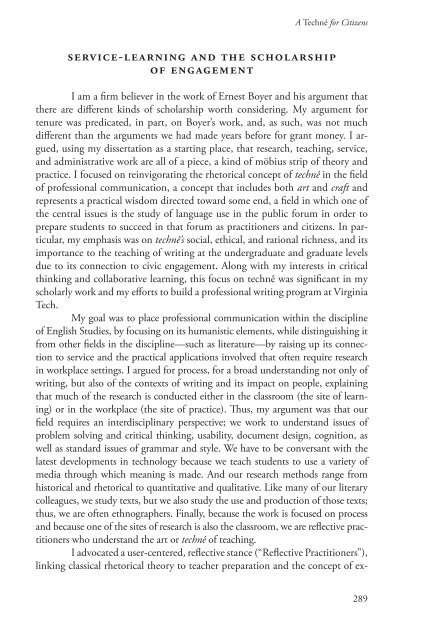Design Discourse- Composing and Revising Programs in Professional and Technical Writing, 2010a
Design Discourse- Composing and Revising Programs in Professional and Technical Writing, 2010a
Design Discourse- Composing and Revising Programs in Professional and Technical Writing, 2010a
Create successful ePaper yourself
Turn your PDF publications into a flip-book with our unique Google optimized e-Paper software.
A Techné for Citizens<br />
service-learn<strong>in</strong>g <strong>and</strong> the scholarship<br />
of engagement<br />
I am a firm believer <strong>in</strong> the work of Ernest Boyer <strong>and</strong> his argument that<br />
there are different k<strong>in</strong>ds of scholarship worth consider<strong>in</strong>g. My argument for<br />
tenure was predicated, <strong>in</strong> part, on Boyer’s work, <strong>and</strong>, as such, was not much<br />
different than the arguments we had made years before for grant money. I argued,<br />
us<strong>in</strong>g my dissertation as a start<strong>in</strong>g place, that research, teach<strong>in</strong>g, service,<br />
<strong>and</strong> adm<strong>in</strong>istrative work are all of a piece, a k<strong>in</strong>d of möbius strip of theory <strong>and</strong><br />
practice. I focused on re<strong>in</strong>vigorat<strong>in</strong>g the rhetorical concept of technê <strong>in</strong> the field<br />
of professional communication, a concept that <strong>in</strong>cludes both art <strong>and</strong> craft <strong>and</strong><br />
represents a practical wisdom directed toward some end, a field <strong>in</strong> which one of<br />
the central issues is the study of language use <strong>in</strong> the public forum <strong>in</strong> order to<br />
prepare students to succeed <strong>in</strong> that forum as practitioners <strong>and</strong> citizens. In particular,<br />
my emphasis was on technê’s social, ethical, <strong>and</strong> rational richness, <strong>and</strong> its<br />
importance to the teach<strong>in</strong>g of writ<strong>in</strong>g at the undergraduate <strong>and</strong> graduate levels<br />
due to its connection to civic engagement. Along with my <strong>in</strong>terests <strong>in</strong> critical<br />
th<strong>in</strong>k<strong>in</strong>g <strong>and</strong> collaborative learn<strong>in</strong>g, this focus on technê was significant <strong>in</strong> my<br />
scholarly work <strong>and</strong> my efforts to build a professional writ<strong>in</strong>g program at Virg<strong>in</strong>ia<br />
Tech.<br />
My goal was to place professional communication with<strong>in</strong> the discipl<strong>in</strong>e<br />
of English Studies, by focus<strong>in</strong>g on its humanistic elements, while dist<strong>in</strong>guish<strong>in</strong>g it<br />
from other fields <strong>in</strong> the discipl<strong>in</strong>e—such as literature—by rais<strong>in</strong>g up its connection<br />
to service <strong>and</strong> the practical applications <strong>in</strong>volved that often require research<br />
<strong>in</strong> workplace sett<strong>in</strong>gs. I argued for process, for a broad underst<strong>and</strong><strong>in</strong>g not only of<br />
writ<strong>in</strong>g, but also of the contexts of writ<strong>in</strong>g <strong>and</strong> its impact on people, expla<strong>in</strong><strong>in</strong>g<br />
that much of the research is conducted either <strong>in</strong> the classroom (the site of learn<strong>in</strong>g)<br />
or <strong>in</strong> the workplace (the site of practice). Thus, my argument was that our<br />
field requires an <strong>in</strong>terdiscipl<strong>in</strong>ary perspective; we work to underst<strong>and</strong> issues of<br />
problem solv<strong>in</strong>g <strong>and</strong> critical th<strong>in</strong>k<strong>in</strong>g, usability, document design, cognition, as<br />
well as st<strong>and</strong>ard issues of grammar <strong>and</strong> style. We have to be conversant with the<br />
latest developments <strong>in</strong> technology because we teach students to use a variety of<br />
media through which mean<strong>in</strong>g is made. And our research methods range from<br />
historical <strong>and</strong> rhetorical to quantitative <strong>and</strong> qualitative. Like many of our literary<br />
colleagues, we study texts, but we also study the use <strong>and</strong> production of those texts;<br />
thus, we are often ethnographers. F<strong>in</strong>ally, because the work is focused on process<br />
<strong>and</strong> because one of the sites of research is also the classroom, we are reflective practitioners<br />
who underst<strong>and</strong> the art or technê of teach<strong>in</strong>g.<br />
I advocated a user-centered, reflective stance (“Reflective Practitioners”),<br />
l<strong>in</strong>k<strong>in</strong>g classical rhetorical theory to teacher preparation <strong>and</strong> the concept of ex-<br />
289


















